- Details
-
Published on Wednesday, 12 May 2021 21:22
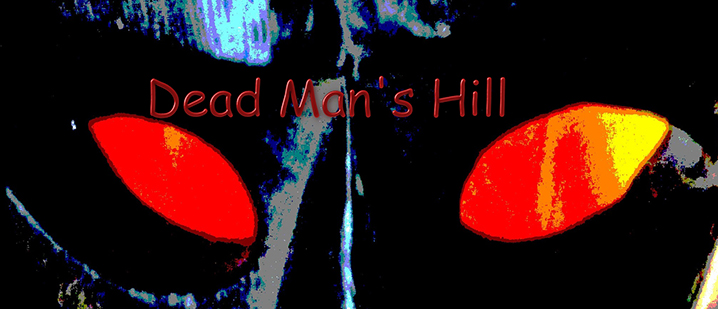
Belgian solo project Dead Man’s Hill was formed in 1998 by Bart Piette, also known by the name Piette Yetayi. His intention was "making dark and cold music, especially influenced by The Moon Lay Hidden Beneath A Cloud, and early In Slaughter Natives, but with a more aggressive feel, by incorporating black/death metal influences. The lyrics of Dead Man's Hill revolve around Haïtian voodoo cultists (Culte des morts) and the sickness/cancer that mankind is”, as he stated himself. Although Dead Man’s Hill sound kept changing a lot during the years, ritual dark ambient-industrial, neoclassical and bombastic martial genres host it best. Dead Man's Hill project released a lot of music material, and two more on the way. As well as many interesting things, if decide to stick with reading the interview.
Interview with: Bart
Conducted and edited by Jerneja
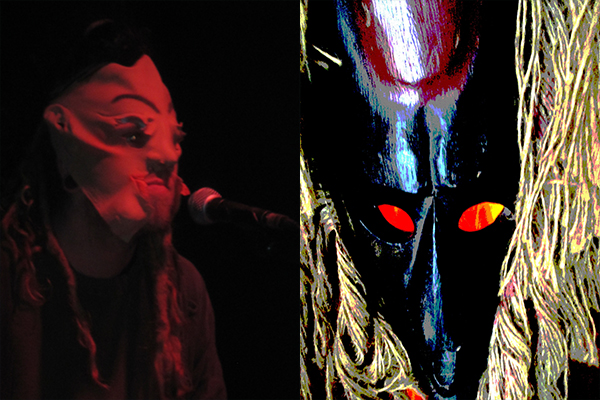 Jerneja: Hello Bart, thank you for accepting my interview request. I hope you are as excited as I am about it.
Jerneja: Hello Bart, thank you for accepting my interview request. I hope you are as excited as I am about it.
Bart: Hello Jerneja, thank you for the interview - yes, I absolutely am, definitely.
Jerneja: Among several music projects you were and still are engaged in, Dead Man's Hill takes a special place. Not only it has the most extensive discography, but it is also the most recognisable. We'll come to this latter. Tell me first, how did you come up with Dead Man's Hill name. (There are some sites around the world and at least one book carrying this name, but most of them appeared after your project was born.)
Bart: Dead Man's Hill is actually the name of a slope in the village Clophill (Bedfordshire). Upon this slope, there is a church where some extreme cases of necromancy took place. So it's really about the ruin of the old church and its atmosphere. During that time in my life, I was really fascinated by the theory of necromancy (and other such subjects).
Jerneja: What is the story behind Dead Man's Hill beginnings?
Bart: I wanted to make something of my own and didn't want to be dependent on other musicians, neither to be bound by compromises. It had to sound the way I wanted. Around that time - in 1998, if I'm correct - I remember seeing a concert of Die Verbannten Kinder Evas and saw that Richard Lederer was only using a synthesizer and a minidisc with a backing track, and so I realized that I could maybe work similarly. Not much later, I started to write tracks and performances with a similar set-up. In the beginning, I didn't have much (nor decent) equipment - the first three demos I made with a Casio-keyboard, a minidisc recorder, a cheap DJ-mixer and a small fx unit that I borrowed from a friend. But I had a lot of time and, although the sound wasn't that good, the inspiration was there, and it was satisfying enough for me...
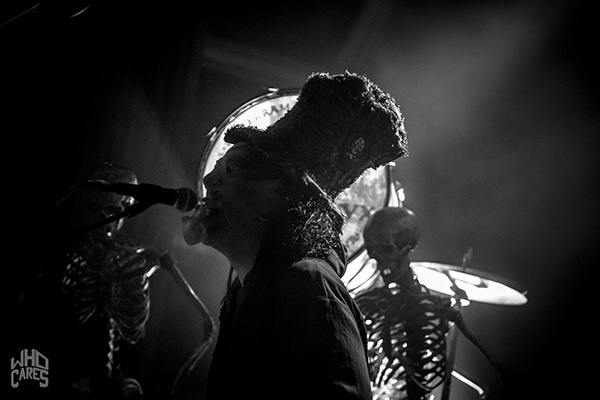 Jerneja: Dead Man's Hill music has gone through many transformations from one album to another. I suppose the inspiration behind each album was also different?
Jerneja: Dead Man's Hill music has gone through many transformations from one album to another. I suppose the inspiration behind each album was also different?
Bart: Yes, that's right. Throughout all the years of Dead Man's Hill existence, a lot of things changed for/in me, and there's definitely a fine thread that can be followed from the debut album till now. Besides, I've always been blessed with a strong imagination that helps (or better, compels) me to write lyrics and fitting music for it (or vice versa).
Jerneja: Considering the amount of music you have released so far with several projects, you have no problem with inspiration. How or where you usually get inspired?
Bart: In the earlier years, inspiration came especially from books, feelings, imagination, some movies, other bands in the gothic/industrial genre, misanthropy, the apocalypse I longed for so much, etc... But slowly, this all changed and my inspiration started to come mainly from ritual/meditation/adoration, shamanic journeying, the calls of the owls and the foxes, the sound of the wind rustling through the trees, the storm, the thunder and lightning, the silence, the forest, crystals, the sound of water flowing out of a spring in the forest during the night, only to name a few. Also, there's the spark that can be ignited by creating a single sound. Combined with certain other sounds the newly formed sound becomes a fire, and that fire has the potential to become a song.
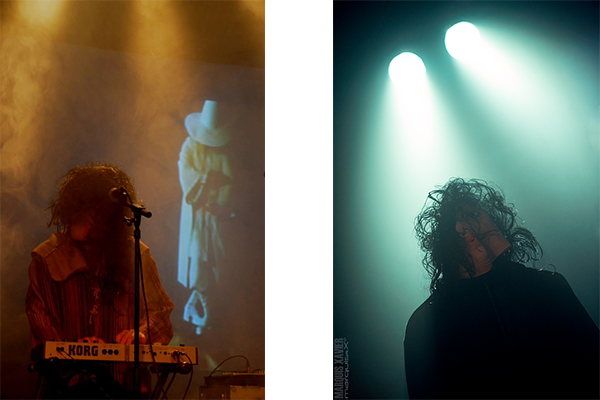 Jerneja: You are working on a new album with Dead Man's Hill. Can you already reveal some details about it?
Jerneja: You are working on a new album with Dead Man's Hill. Can you already reveal some details about it?
Bart: I'm working on two albums at the moment, and expectations are that one of them will be unleashed by the end of this year. Although I'm eager to talk about it, I cannot reveal more of it yet, except that it's about two conceptual albums that are very different from each other.
Jerneja: What about the music itself; shall we expect another transformation?
Bart: Yes, absolutely. When I continue to transform (or grow, I suppose), the music transforms with me - I believe these are parallel paths. The main reason why Dead Man's Hill still exists these days is that I feel the need to express feelings and ideas that I experience during meditation, ritual and shamanic journeying. And, of course, also because I love to experiment and create twisted sounds with synthesizers. Strange as it may sound, the creation of sound is a healing process in itself. I strongly feel that music/sound is the perfect medium to express and translate all these feelings and emotions, so I suppose I'll keep writing music as long as I'm on this path.
Jerneja: Many Dead Man's Hill songs (or at least their instrumental parts) could easily be regarded as cinematic music. Listening to these is almost like watching a turning point in a movie...Bart: Thanks for the compliment! In that case, one of my missions with
Dead Man's Hill is completed.
Jerneja: But you present your music as ritual dark ambient - industrial - neoclassical act. Wherefrom did this fascination with rituals come? I bet you have attended some rituals, probably in versatile parts of the world...Bart: Goh, I don't experience it as a fascination, to be honest, more as a necessity and as a way to celebrate life. Without practising certain rituals to grow and to attune/harmonize daily to the wildness and purity of Mother Nature, I'd feel empty and disconnected.
Jerneja: OK. The last question was either sublime, or you just wanted to avoid the theme. So, now directly. The majority of Dead Man's Hill songs is about rituals in one way or another. There are celebrations, initiations, meditations,... e.g. "Black Crosses - A Guédé Celebration", "Crossing The Abyss", "Strix Aluco - The Gates Of The Deep Way",... Not to mention the song "To Marinette-Bois-Chèche"...Bart: Let's keep it on sublime, thank you. I love it when people go just "inside" of the music and feel for themselves. It makes the world so much bigger.
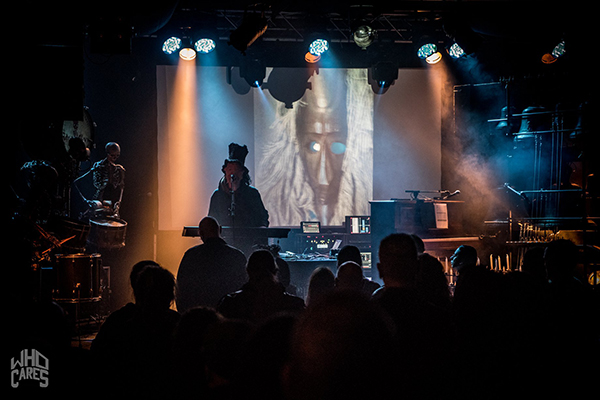 Jerneja: What about you - are you a ritual person in everyday life?Bart
Jerneja: What about you - are you a ritual person in everyday life?Bart: Yes, in a certain way (of the so many possibilities) - for me, it's a way of life, a way of consciousness and most important: way of connection -. Without it, everything would look different (and a lot more empty) to these eyes.
Jerneja: What about the "rituals" of composing music, or how does your composing process looks?Bart: There are two ways: the first one is about recalling certain energy or experience of any kind after trance-work or ritual. When I have time, I go into the recording studio some time afterwards, and I already know how everything must sound. Thereafter it's a matter of recalling the energy, and when all goes right, and the right sounds come out, things start to flow. When the atmosphere is right, and I feel that I made a more or less correct translation from music to sound, then there's a song. The second way is that I dive into the studio and start to create sounds just to create sounds or for healing purposes for myself. When I like the sounds that come out, I continue to work it out after I went into trance-states and meditations - the writing process of one such song usually costs me some weeks or longer. Afterwards, further inspiration comes in, and more sounds and sometimes lyrics are added until the result I long for is completed. As for the technical part of composing, I often start with some basic synth sounds to determine the desired tone and rhythm. These sounds will eventually be deleted afterwards, as the song in progress is filled with more interesting sounds. After that, I start to create a sound with some type of flute, a bell, my voice, or another sound source which I make unrecognizable and then reform with synths that allow me to do that. When that's done I add another voice, flute or drum to that, pure or manipulated in a similar way.
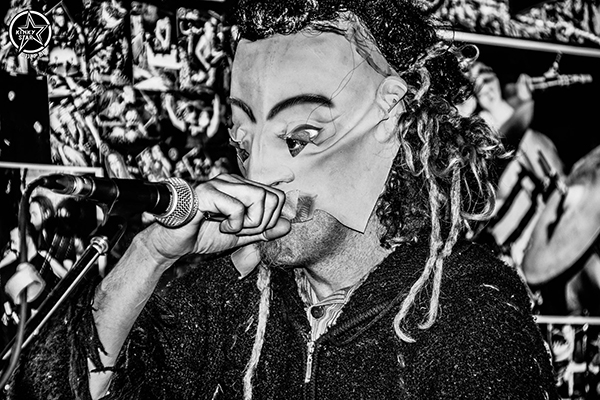 Jerneja: Considering the ritual genre, many unusual instruments must appear in your music. Which are they, and which of these you are most fond of?Bart
Jerneja: Considering the ritual genre, many unusual instruments must appear in your music. Which are they, and which of these you are most fond of?Bart: They include several types of flutes and didgeridoos/Yidaki, a ritual bell, and above all, my voice... All these are used pure or totally manipulated through synths that allow me to do that. My favourites among them are my native American flutes, my voice and my didgeridoos, although I don't always find a place for didgeridoo in my later work. Someday I'd definitely like to create a new album with a lot of tribal influences with a special place for the didgeridoo in it.
Jerneja: What about the instruments in general - how many do you play? And, is there some particular, maybe one responsible for a new song's rising?Bart: Too many to maintain them all. In the beginning, I started just with synths, bass, and guitar. Later on, I got interested in the didgeridoo, native flutes, shamanic drums, electronic sound design, field recordings, etc... I barely play the guitar or bass guitar the last few years, but will not shun to use them if they fit in a song. For the latter part of your question: it totally depends which sounds will be fitting for it, in one way or another.
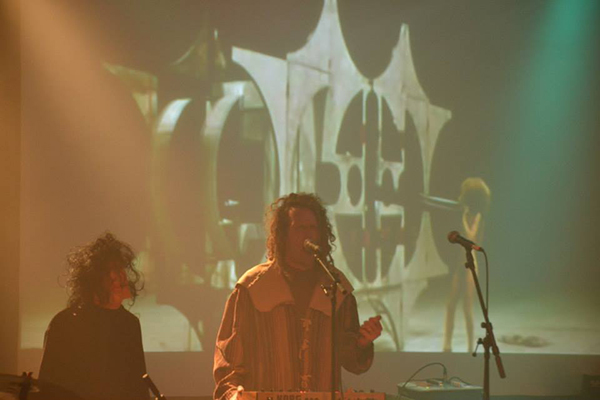 Jerneja: How would you describe Dead Man's Hill project, and what is its speciality regarding your other projects?Bart
Jerneja: How would you describe Dead Man's Hill project, and what is its speciality regarding your other projects?Bart: I experience it as deeper on every level. Musically it's much more complex than anything else I've ever done before, and of course, my spirit goes into it. It also gives me this chance because I'm doing this alone, and I have total freedom to experiment and create when I'm in the right mood to create what I want to.
Jerneja: Is there any album or maybe a song taking a special place in your discography, and how so?Bart: I think that will be the threeways split
The Circular Shades Of The Equinox, together with
Shibalba and
Deathwalk. Besides that, it contains the best work that I've ever written (to my feeling). I also like
Shibalba and
Deathwalk a lot, both their music as the people behind it, and it's a pleasure and an honour for me to be with them on the same album.
Jerneja: How many different languages can we find in Dead Man's Hill lyrics? Any ancient or tribal languages, perhaps?Bart: Only three: Dutch, English and very sometimes a little bit of French. But I must admit that I never shun to use heavy dialect.
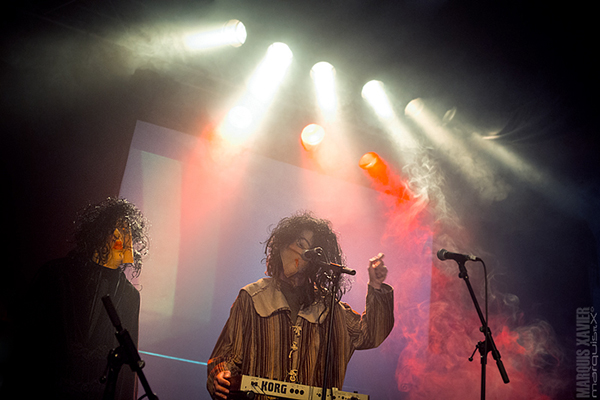 Jerneja: Are you also the artist of Dead Man's Hill cover artworks? If so, would you tell us something about this process?Bart
Jerneja: Are you also the artist of Dead Man's Hill cover artworks? If so, would you tell us something about this process?Bart: Most artworks on my releases are spent out to visual artists with experience via the record labels, and I have to tell you, I'm very grateful for this! I only made the artwork for
Crossroads, and I'm happy I didn't have to do more till so far. I experience creating visual art as a pain in the ass, and the less I have to do this, the better.
Jerneja: Are you planning to have live gigs again after the pandemic related circumstances allow? Would you share with us some "outstanding" memories of Dead Man's Hill live performances?Bart: I'd definitely like to perform again with
Dead Man's Hill, but I will wait till concerts can proceed again as they used to. Also,
Dead Man's Hill will never be a band that you'll see touring. Performing two or three times a year is enough for me. Outstanding memories from live performances - go, not really - but I like it a lot when the sound is good, when there's a nice contact with the organisation and when the visitors are happy about the concert. One of the outstanding memories for me was when I was invited to perform in Lisbon, Portugal, for the second time. This time I stayed there for four days and during these days the organiser used all his free time to hang out with me and show me all the beautiful and interesting places. I'll never forget this.
Jerneja: What are your plans regarding composing music for other music projects?Bart: Not too much to be honest. You can expect everything, but it depends on inspiration. The next album is almost finished and is waiting to be released by the end of this year. I'm currently working on another one that can best be seen as a special and deep trance document. I don't know yet, how this work will evolve, but it will be very different from the usual
Dead Man's Hill-stuff, more bordering on the ritual soundscape domain. For the rest, I'd like to participate in various compilations here and there and see what the future brings.
Jerneja: Is there anything you would like to share with us at the end of this interview? Something I haven't asked you or some message to Terra Relicta readers?Bart: I think you covered quite everything, but I want to thank your readers for taking the time to read the interview. For everyone interested, I have two links where you can hear more music.
Jerneja: Thank you, Bart, for joining me in this interview. Good fortune with your two albums in the making and in general.
Dead Man's Hill links:
Facebook,
Bandcamp,
Soundcloud.
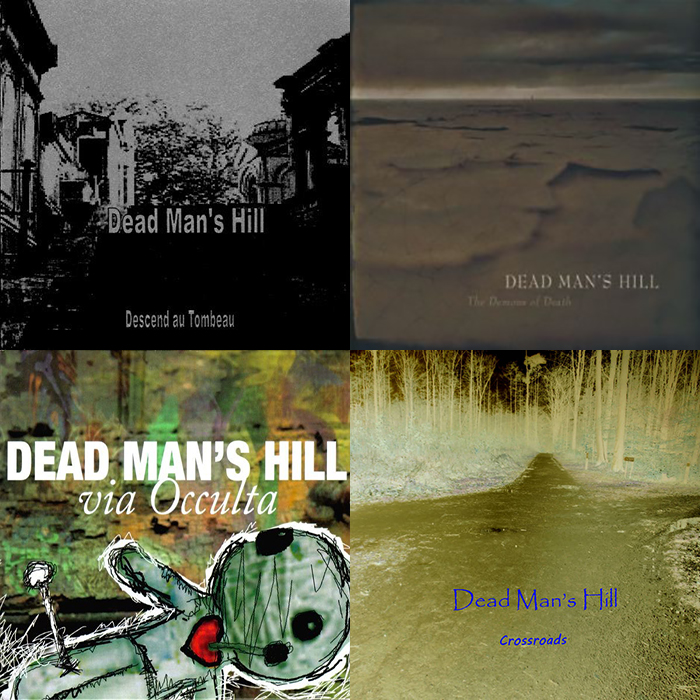


 Jerneja: Hello Bart, thank you for accepting my interview request. I hope you are as excited as I am about it.
Jerneja: Hello Bart, thank you for accepting my interview request. I hope you are as excited as I am about it. Jerneja: Dead Man's Hill music has gone through many transformations from one album to another. I suppose the inspiration behind each album was also different?
Jerneja: Dead Man's Hill music has gone through many transformations from one album to another. I suppose the inspiration behind each album was also different? Jerneja: You are working on a new album with Dead Man's Hill. Can you already reveal some details about it?
Jerneja: You are working on a new album with Dead Man's Hill. Can you already reveal some details about it? Jerneja: What about you - are you a ritual person in everyday life?
Jerneja: What about you - are you a ritual person in everyday life? Jerneja: Considering the ritual genre, many unusual instruments must appear in your music. Which are they, and which of these you are most fond of?
Jerneja: Considering the ritual genre, many unusual instruments must appear in your music. Which are they, and which of these you are most fond of? Jerneja: How would you describe Dead Man's Hill project, and what is its speciality regarding your other projects?
Jerneja: How would you describe Dead Man's Hill project, and what is its speciality regarding your other projects? Jerneja: Are you also the artist of Dead Man's Hill cover artworks? If so, would you tell us something about this process?
Jerneja: Are you also the artist of Dead Man's Hill cover artworks? If so, would you tell us something about this process?